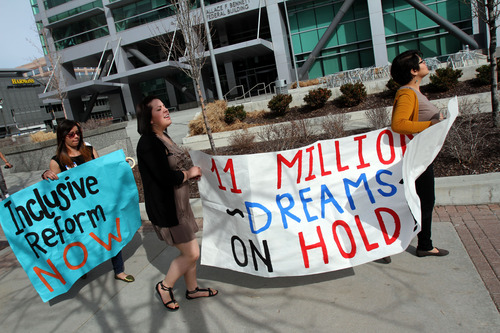This is an archived article that was published on sltrib.com in 2013, and information in the article may be outdated. It is provided only for personal research purposes and may not be reprinted.
When politicians embrace undocumented immigrants in the reform debate, they're almost always the Dreamers — the kids brought by their parents to the United States who are sympathetic, blameless and ambitious.
Like Angie Rodríguez, president of the Salt Lake Dream Team. She regularly attends a nightly immigration vigil in front of Salt Lake City's federal building and closely watches Washington. She just graduated from the University of Utah with a psychology degree and a minor in Japanese, hoping someday to teach English in Japan. She's also long dreamed of joining the military, perhaps to aid victims of natural disasters. Despite being commanding officer of her high school marksmanship team — with a full-ride ROTC scholarship — Rodríguez was turned away by the Marines for lack of a green card or Social Security card.
If the reform bill passes, she could eventually wear the uniform, though graduate school is another draw. Either way, Rodríguez feels fortunate — and compelled to get undocumented immigrants engaged.
"It's been emotional hearing how a lot of people don't really know what's going on or how the amendments will affect them," she says. "It's kind of heartbreaking that a lot of them have lost hope."
Like Rodríguez, most Dreamers speak fluent English — serving as cultural tour guides for their families — and many succeed in school and complete college. Congress has debated the Dream Act, which spawned their nickname, for a dozen years. The act would let them become citizens in eight years, five years sooner than other unauthorized immigrants.
A significant number of Republicans have reservations about a pathway to citizenship, but many have a soft spot for Dreamers. Sen. Orrin Hatch, R-Utah, was an original Dream Act sponsor, then backed away from the idea before embracing it again. Rep. Chris Stewart, R-Utah, opposes a path to citizenship for the undocumented, though he isn't sure he's ready to extend that stand to Dreamers.
President Barack Obama granted these young immigrants a two-year deferred action reprieve and he had Dreamers front and center in his immigration reform event at the White House.
Dreamers have become an emboldened political force, putting pressure on the GOP to accept immigration reform or face years of electoral payback. After all, in the 2012 election, Obama swamped Mitt Romney in the Latino vote 71 percent to 27 percent, and that segment of the electorate is growing.
Itza Hernández, also with the Salt Lake Dream Team, is among them. She came to the United States from Mexico at age 4 and has since seen two of her eight siblings deported "to a country that is no longer familiar." She says immigration reform is highly personal, but with Hatch and others, the debate sounds cold, even craven — and always bureaucratic.
"He's so focused on high-tech workers and border security and I think the focus should be on the families who are impacted by this broken immigration system," Hernández says. "These are our parents and our brothers and sisters and the focus should be on them."



